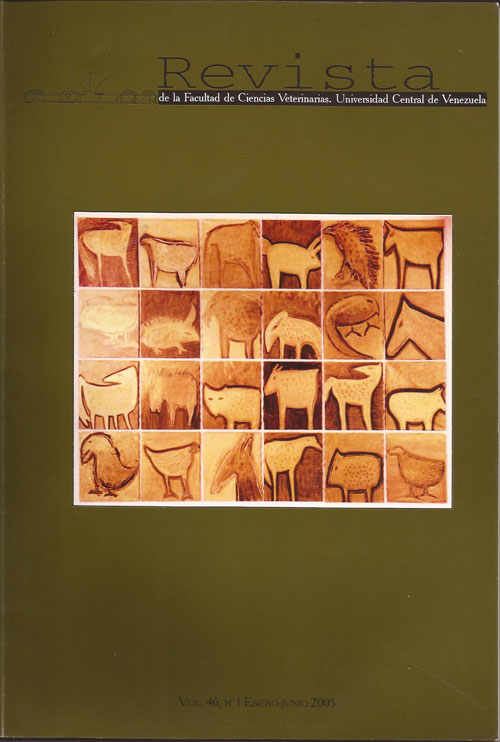CARACTERIZACIÓN ANTIGÉNICA DE CEPAS DE VIRUS RÁBICO AISLADAS DE DIFERENTES REGIONES EN VENEZUELA. PERIODO 2001-2004
Contenido principal del artículo
Resumen
A objeto de conocer la situación epidemiológica de las variantes antigénicas del virus rábico en Venezuela, se analizaron 45 cepas, aisladas durante el período 2001-2004. Estas fueron amplificadas en cerebro de ratones lactantes y la caracterización antigénica se realizó por inmunofluorescencia indirecta de improntas de los cerebros de esos animales, utilizando un panel de 8 anticuerpos monoclonales dirigidos contra la nucleocápside viral. De las muestras analizadas, 37 fueron aisladas de bovinos, 1 de canino, 1 de gato, 4 de equinos y 2 de ovinos, con una distribución en diversas regiones del país. Las cepas fueron ubicadas como variante antigénica 3 (Desmodus rotundus), sugiriendo que estos quiropteros hematófagos se ubicaron como la principal especie transmisora del virus rábico, para los animales domésticos, durante el periodo estudiado. Esta variante también fue aislada en un perro y un gato de zonas urbanas libres de rabia canina, lo que sugiere que el quiróptero invadió en ese momento, un nicho que no correspondía a su hábitat natural, transmitiendo el virus a las mascotas. Esta investigación es la segunda efectuada en Venezuela en 10 años. La variante circulante es mantenida en un ciclo cuyo principal reservorio es D. rotundus. Sin embargo, no se descarta la posibilidad de la presencia de otras variantes, en cuyo ciclo estén involucradas diferentes especies de mamíferos salvajes como vectores transmisores.
Antigenic Characterization of Rabies Virus Strains Isolated from Different Regions in Venezuela. 2001-2004 Period
ABSTRACT
Forty-five rabies strains from domestic animals, collected in Venezuela between 2001 and 2004, were characterized by using eight anti-nucleoprotein monoclonals antibodies. Of all strains analyzed, 37 were isolated from bovines, 1 from canine, 1 from cat, 4 from equines and 2 from ovines, distributed on diverse regions of the country. Antigenic characterization demostrated that all strains were identified as variant 3 associated with Desmodus rotundus bats, suggesting that vampire bats were the principal transmissive specie of rabies virus to domestic animals during the studied period. This variant was isolated in a dog and a cat of urban areas free of canine rabies, indicating that vampire bats invaded in that moment, a niche that would not belong to their natural environment, transmissing rabies virus to pets. This is the second epidemiological research within the last ten years carried out in Venezuela to demostrate the variants of rabies virus which are circulating in the country.
Antigenic Characterization of Rabies Virus Strains Isolated from Different Regions in Venezuela. 2001-2004 Period
ABSTRACT
Forty-five rabies strains from domestic animals, collected in Venezuela between 2001 and 2004, were characterized by using eight anti-nucleoprotein monoclonals antibodies. Of all strains analyzed, 37 were isolated from bovines, 1 from canine, 1 from cat, 4 from equines and 2 from ovines, distributed on diverse regions of the country. Antigenic characterization demostrated that all strains were identified as variant 3 associated with Desmodus rotundus bats, suggesting that vampire bats were the principal transmissive specie of rabies virus to domestic animals during the studied period. This variant was isolated in a dog and a cat of urban areas free of canine rabies, indicating that vampire bats invaded in that moment, a niche that would not belong to their natural environment, transmissing rabies virus to pets. This is the second epidemiological research within the last ten years carried out in Venezuela to demostrate the variants of rabies virus which are circulating in the country.
Descargas
Los datos de descargas todavía no están disponibles.
Detalles del artículo
Número
Sección
Artículos de Investigación

